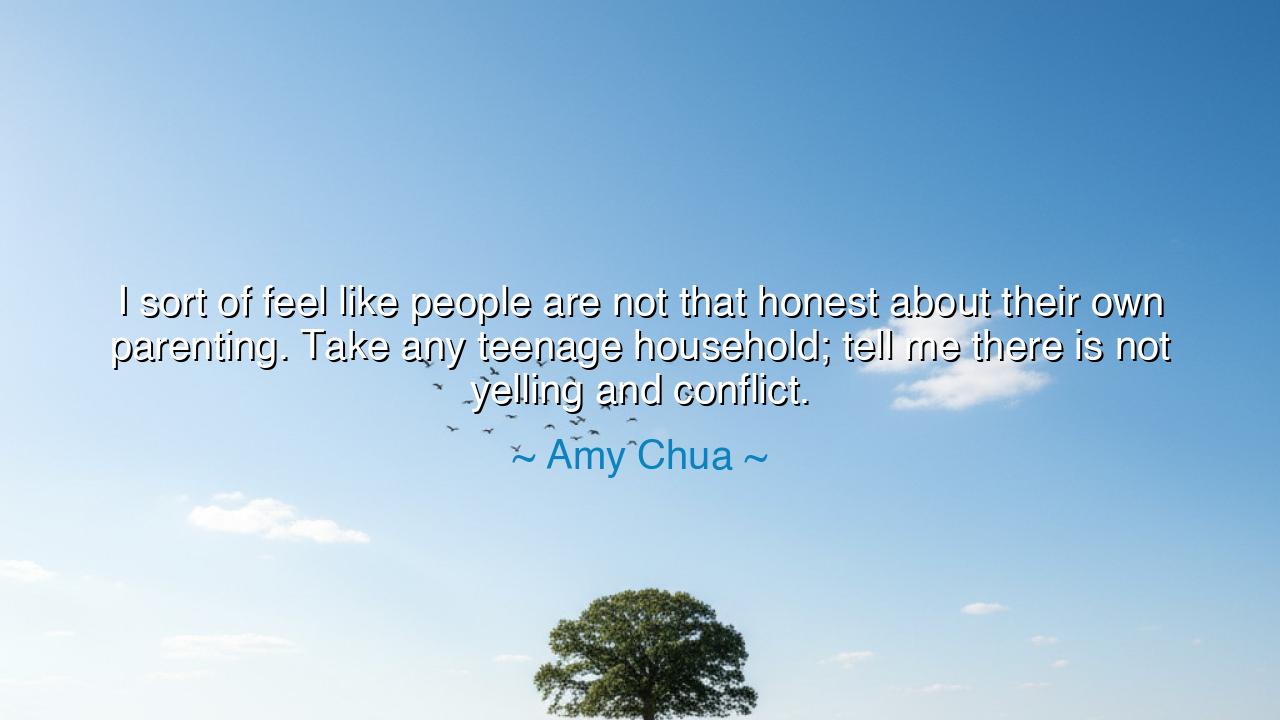
I sort of feel like people are not that honest about their own
I sort of feel like people are not that honest about their own parenting. Take any teenage household; tell me there is not yelling and conflict.






In the words of Amy Chua, we hear a sharp and unvarnished truth: “I sort of feel like people are not that honest about their own parenting. Take any teenage household; tell me there is not yelling and conflict.” In this statement lies both courage and revelation. For too often, society dresses the family in garments of perfection, presenting the home as a sanctuary of harmony, while behind closed doors, tempers flare and voices rise. Chua unmasks this illusion and reminds us that the reality of raising children—especially in the turbulent years of adolescence—is far more complex, filled with storm as well as calm.
The ancients too knew this truth. In the plays of Sophocles and Euripides, the family was rarely a place of endless peace. Conflict between parent and child was depicted as natural, even inevitable, for the young always test the old, and the old always struggle to guide the young. It was understood that conflict is not the sign of failure, but of growth—that the fire of disagreement tempers the soul, just as iron is forged in the furnace. Chua’s words echo this wisdom: that the raising of teenagers is not a gentle stroll, but a wrestling match between independence and authority, between freedom and discipline.
History gives us countless examples. Consider the relationship between Mozart and his father, Leopold. Leopold was both teacher and tyrant, pushing the young genius relentlessly, while Mozart often rebelled against his father’s stern demands. Their household rang with yelling and strife, yet from that crucible arose music that changed the world. Their story proves Chua’s claim: even in families remembered for greatness, the path was marked with conflict, not harmony. It was through these clashes that strength and identity were forged.
Chua also confronts the fear of dishonesty. When parents pretend that their homes are always serene, they do not only deceive others—they burden themselves with shame when reality breaks through. For every household has its struggles, yet few dare to admit them. To be honest about parenting is to acknowledge that love is not the absence of conflict, but the endurance of love through conflict. This honesty releases parents from the false burden of perfection and allows them to embrace the messy, human truth of family life.
The meaning of her words is thus both liberating and humbling. Parenting is not a path of constant joy, nor is conflict a sign of failure. Rather, it is through these very struggles that parent and child grow together. A teenager’s shouting is often the cry of a soul seeking its own place; a parent’s rebuke is the echo of love trying to protect. The clash is painful, yet sacred, for it is the sound of a relationship being stretched but not broken.
The lesson for us is clear. First, let us be honest about the reality of family life, so that we do not measure ourselves against false images of perfection. Second, let us embrace conflict not as an enemy, but as a teacher, guiding us toward patience, humility, and resilience. Third, let us remember that even in the heat of anger, love remains the foundation—conflict may shake the house, but love must keep its pillars standing.
O seekers of truth, remember this: the household is not a silent garden, but a living forest, full of noise, storms, and struggle, yet also filled with growth, renewal, and strength. Do not be ashamed of the yelling, for even the thunder has its place in the sky. Do not fear the conflict, for even the storm waters nourish the roots of the tree.
Thus, Amy Chua’s words endure as a call to honesty. Let us cast aside the masks of perfection, admit that our families are both beautiful and broken, and find strength in that admission. For the true measure of parenting is not the absence of struggle, but the presence of love that survives it.






AAdministratorAdministrator
Welcome, honored guests. Please leave a comment, we will respond soon